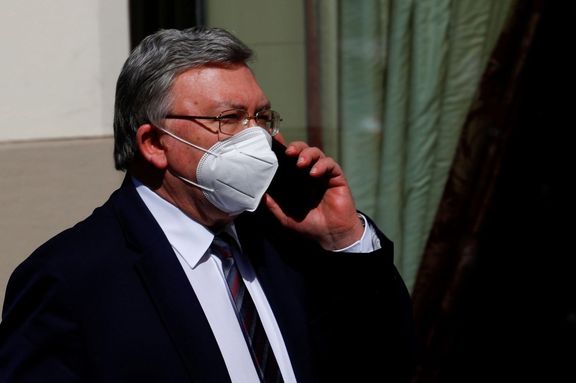Russian Envoy Takes Jab At Iran's Foreign Minister

Mikhail Ulyanov, Russia's envoy to the IAEA, has asked what the refrain “soon” means in statements by Iran’s foreign minister about returning to nuclear talks.

Mikhail Ulyanov, Russia's envoy to the IAEA, has asked what the refrain “soon” means in statements by Iran’s foreign minister about returning to nuclear talks.
"Does anybody know what it can mean in practical terms?" Ulyanov said in a tweet in a rare biting language Saturday quoting Hossein Amir-Abdollahian that talks with world powers on the revival of the 2015 nuclear agreement would resume "soon".
Since taking office on August 25, Amir-Abdollahian has repeatedly said Iran would be returning to the suspended talks in Vienna, but despite pressure from other participants, Iran has never set a date. On Saturday he once again said multilateral nuclear talks in Vienna will resume “soon”.
In his joint press conference with the visiting Iranian foreign minister Hossein Amir-Abdollahian in Moscow last week, Foreign Minister Sergey Lavrov said Russia believes the way to restore the nuclear agreement lies only in "consistent and full implementation by all parties based on the initially recorded balance of interests". He declared that both Moscow and Tehran believe the Vienna talks must be resumed as soon as possible and that Tehran has indicated to him that it is ready for this.
Tehran has strong relations with Moscow, but it appears that even Moscow's patience is running out with Iran delaying its return to the talks. Iran suspended the talks two days after its presidential elections of June 18. Meanwhile, it is continuing to enrich uranium creating concern in many capitals that it is getting close to having enough fissile material for a bomb.
Iran asked the European Union to have a meeting in Brussels to clarify issues related to the first six rounds of talks in Vienna, but the United States objected, saying such a meeting was not necessary. It appeared Tehran wanted to open a new negotiating track without the presence of Washington.
Iran and Russia may also have other disagreements behind the scenes over Russia's cooperation with Israel regarding Syria, tension between Iran and Azerbaijan which makes large purchases of Israeli weapons including Arrow-3 missiles and surveillance drones, and Iran's wishes to procure military equipment from Russia.
Russian President Vladimir Putin hosted Israeli Prime Minister Naphtali Bennet. Israel's Housing Minister Ze’ev Elkin has said that Putin and Bennet held “deep” discussions on Iran’s nuclear program and a “very wide” conversation on maintaining a coordination mechanism regarding Syria, but there are no details so far about the discussion. "It was decided to keep policies vis-à-vis Russia in place [regarding airstrikes] in Syrian territory,” Ze'ev added.
Iran and Russia both support Bashar al-Assad but have different interestsand do not always see eye to eye in Syria where Iranian presence and influence can be considered as a threat to Israel, which has been targeting Iranian military bases and weapons transfers in Syria since early 2017 while Russia has looked the other way.
In his press conference with the Iranian foreign minister Lavrov said Russia is opposed to "building up military activity" in the Caucasus region or "conducting any exercises of a provocative nature" and added that Azerbaijan has expressed concern over the exercises that were recently held by Iran near its borders." Lavrov also stressed that Russia opposes the "presence of military forces or any non-Caspian states in the Caspian Sea as soon as possible."
The exercises held by Iran in early October near the border with Azerbaijan were one of the largest ever carried out in the northwest of the country.